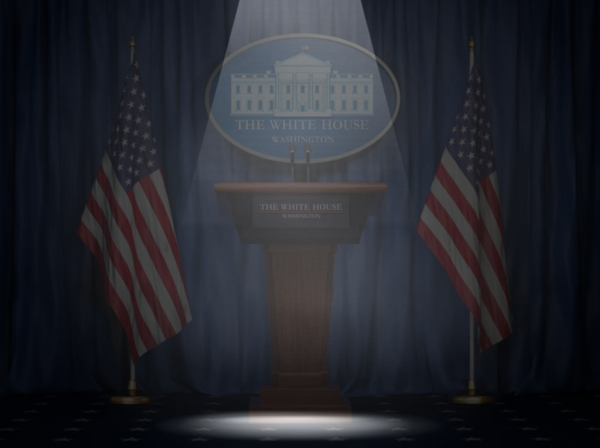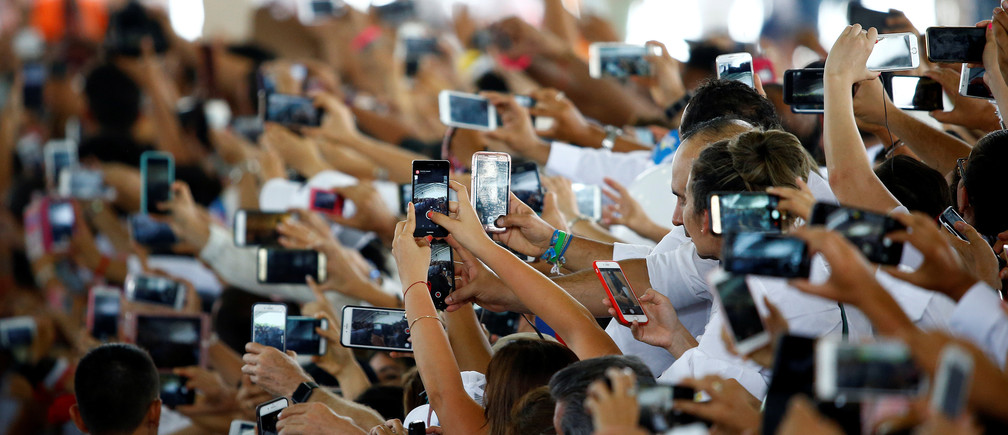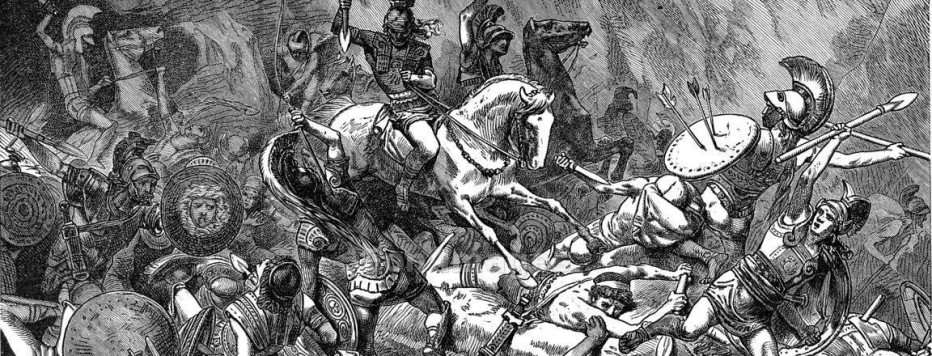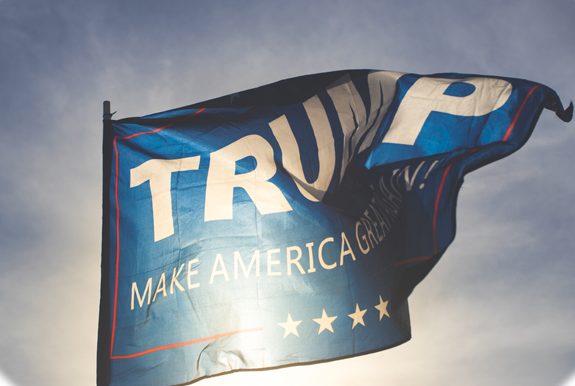Democracy and despotism in a digital age.
Statesmanship in a Time of Violence

Today’s miseducated fame-seekers can’t lead us, unless it’s off a cliff.
It has been at least 50 years since America faced an internal conflagration on the level which we experience these days. Not since the late 1960s, with riots, political violence, assassinations, and war in Southeast Asia, have we seen the multiple disasters like the present pandemic layered with mass urban rioting. If leadership is like steel, tempered in the heat of crisis, remarkable individuals should be rising to the current challenge and steering the nation through these turbulent times.
Yet what we see is a vacuum of leadership. Holed up in the White House, Trump and his presidency have been reduced mostly to tweets and photo ops. Mayors in places such as Minneapolis and New York, both centers of unrest, have shown themselves to be feckless in the face of existential threats to their authority—and grave threats to their cities. They sided with violence rather than with their own citizens. It’s hard to believe that in each city only a few short weeks ago the fight was over whether the municipality would allow its residents to go to religious service. Now rioters and looters may run amok with little fear of police interference.
We see over and over the failure of American leadership. One would think that a pandemic would bring the nation together, yet the nation splits between those who think we should reopen and those who believe in maintaining the lockdown. Should we wear masks, or is the mask a sign of subservience? These disagreements plot fairly neatly along partisan lines. The same is true for police violence and urban rioting.
One would think that we could hold two entirely consistent thoughts in our heads at the same time—for example that excessive violence by police, often with a racial tinge, is wrong, and also that violence in the name of a political agenda is wrong (to say nothing of violence for the sake of violence). A more effective form of leadership (what we used to call “statesmanship”) would appeal to our highest ideals while speaking and acting vigorously against clear injustices.
What cue can we take from the founders? James Madison famously wrote in Federalist #10 that “enlightened statesmen will not always be at the helm.” This is true, and a prudent people plans accordingly. Still, a regime that cannot regularly produce enlightened statesmen is a decadent regime.
The import of Madison’s statement is that the people’s rights are better protected by institutions soundly constructed than by trusting that our leaders will act like angels. An alternative view is that of Madison’s co-author in the Federalist project, Alexander Hamilton, who believed that rights were best protected by a government granted adequate powers to maintain public order.
A third view was held by Anti-Federalists and exemplified by Thomas Jefferson. Jefferson believed the people to be the only “safe depository” of their own rights. He saw the main threat to rights coming from grasping elites using government to enrich themselves at the expense of the people. Educate the people through schooling and a free press, empower them by expanding the franchise, and severely limit government, and the people’s rights would be secure.
What is missing from each of these views, all sound in their own way, is a provision for statesmanship. Madison’s argument relied too much on mere self-interest; Hamilton’s teaching ignored the perils of centralization; Jefferson was naïve regarding the people’s republican virtue. How power is wielded by those in positions of authority is central to a regime’s health. The statesman seeks balance between each of these three positions, recognizing the virtues and potential vices of each.
The job of the statesman is to direct the people toward just government. His tools for this task are rhetoric and the rule of law. The statesman uses rhetoric to reshape the architecture of the nation’s soul, directing opinion toward justice while defending law as the great moderator of the people’s passions. For the statesman political life is not merely about the accumulation of power, but how power is wielded for the common good.
America’s Founding Statesman
This, I think, is one of the many contributions to our political tradition by our country’s statesman par excellence, Abraham Lincoln. Lincoln saw that statesmanship, shaping opinion and rule of law, is necessary for a healthy democratic regime. Lincoln once argued that in a democracy it is ultimately public opinion that rules. “Our government rests in public opinion,” he said in 1856. “Whoever can change public opinion, can change the government, practically just so much.” Whatever the institutional barriers, if a democratic people want something bad enough for long enough, they will get it.
The statesman, therefore, labors to direct opinion towards the good. Lincoln sees an opportunity for the statesman to play part of the educative role envisioned by Jefferson. Hamilton had noted in Federalist #1 that rights are more likely to be trampled by those playing obsequious court to public opinion than those calling for efficiency in government.
Unlike Jefferson, Lincoln does not assume that public opinion is naturally sound. Thus, for example, his decade-long quest to shape opinion away from indifference toward the expansion of slavery and his arguments in favor of Union during the Civil War. Lincoln, our most poetic of presidents, still captures our imagination with his defense of America’s finest ideals.
Further, Lincoln exemplified dedication to the rule of law in his justly honored Lyceum Address of 1838. Here he preaches devotion to the rule of law as a “political religion” against the rule of the mob. No message could be timelier.
Rule of law moderates the passion of the people by channeling it through a predetermined process. Arbitrary rule is the very definition of tyranny. It is especially in times of crisis that due process is most needed. Lincoln in the Lyceum Address notes three evils of mob rule, all of which we see exhibited in recent days.
First, the mob is indiscriminate. It sweeps up the innocent with the guilty. Second, the mob encourages the lawless in spirit to become lawless in fact. Finally, mob rule discourages truly good people. Seeing property and lives wantonly destroyed, the best give up hope in democracy and look to some alternative form of government for protection of rights.
In our current crisis, a statesman should rhetorically appeal to the people by passionately defending equality before the law and denouncing abuses of force by law enforcement. The near-universal belief in the African-American community that they are special targets of police malfeasance cannot simply be ignored or brushed aside.
A statesman would not rhetorically “stand against” racism in law enforcement, but actually come up with practical ways to ensure police departments conform to equal protection under the law. We’ve had plenty of “conversations” about race. How about some actions?
At the same time, a statesman would both speak and act against mob violence, explaining why rule of law is so fundamental to a free people. President Trump speaks loudly for someone so unwilling to act on his words. In the face of today’s civil unrest he has done little more than score political points off of his opponents, although a recent executive order creating national standards for credentialing and accountability for law enforcement is a step in the right direction. It remains to be seen if the president’s rhetoric can match the spirit of the order.
While there may be a time to make political hay out of a crisis, the time to do so is not when the crisis is at its height. Our feckless mayors and governors struggle to speak against violence. An early failure of Minnesota leadership was to try and convict Officer Derek Chauvin in the court of public opinion before any investigation had been completed.
Surely Officer Chauvin acted in a brutal manner, almost certainly criminally so. But it is precisely those who are most obviously guilty who most deserve due process. Minnesota leaders inflamed public opinion by siding with passion over process, unable or unwilling to properly balance the people’s desire for justice with the imperative of due process.
The Celebritization of Politics
How did we come to such a sorry state? Some point to Donald Trump as the nadir of statesmanship. Trump doesn’t spend much time reading about the history, literature, or culture of statesmen. Like the fictional Chauncey Gardner, he seems to have gained almost all his knowledge of the world through television.
In the manner of the professional wrestling shows he used to inhabit, Trump resides in a world neatly divided between good guys (people who advance his interests) and heels (everyone else). He encourages this worldview in his supporters, all the way down to name-calling more apt for the schoolyard than the highest office in the land.
At the same time, however, it must be noted that Barack Obama exhibited many traits in common with Donald Trump.
To be sure, Obama was better-read (at least by the standards of today’s elite) and better at signaling respect for political norms. But like Trump, Obama ascended to the presidency almost out of nowhere based on the fawning adulation of disaffected voters taken with his charisma.
Before becoming president, Obama’s main achievement seems to have been elevating himself to ever-higher positions of authority without actually accomplishing anything. Obama was elected president of the Harvard Law Review without ever publishing a signed piece in the Review. He was hired as a senior lecturer at University of Chicago Law School without a single academic publication or having any significant accomplishments in the law. He got himself elected to the Illinois legislature, where he earned the nickname “Senator Present” for his penchant for ducking difficult votes. Elected to the United States Senate, he authored no important pieces of legislation, chaired one sub-committee that never met, and was voted by Senate staffers one of the Senate’s biggest “show horses” (his main competition: Chuck Schumer and Joe Biden).
Yet Obama was hailed as “the One” by Oprah Winfrey, gave a nomination acceptance speech in a space designed to make him appear a Greek god, and was the subject of fawning videos put together by celebrities. During the holiday season after his election in 2008, on Garrison Keillor’s then-extant “Prairie Home Companion” radio show, the words to the song “In the Bleak Midwinter” were rewritten to celebrate not the Holy Family’s arrival in Bethlehem, but the Obamas’ arrival in Washington, D.C.
As president, Obama was weak and indecisive—even the eponymous “Obamacare” is actually more accurately “Pelosicare”—and led his party to its lowest point electorally in nearly a century. Hailed as an eloquent speaker, Obama was really just a fine actor. If one reads Obama’s speeches, even his most important ones such as his inaugural addresses or his prominent campaign speech on race, one is struck by the hackneyed phrases and, frankly, the leaden quality of the prose. Like a good actor, Obama was talented at making a bad script palatable. Obama was a celebrity-president in Daniel Boorstin’s sense of the term, a person who is famous for being famous rather than any notable accomplishment.
This confluence of celebrity and politics is not confined to the chief executive. The partisan news media makes instant heroes and demigods out of the politician of the moment most in alignment with their message and interests. Regardless of partisanship, over the past couple decades we’ve seen celebrity legislators such as Sonny Bono, Fred Thompson, and Al Franken.
Recently retired Representative Sean Duffy first came to attention as a boozy frat boy on MTV’s Real World. Senator Ben Sasse—himself light on legislative achievements and heavy on the publishing—has noted that many people seem to get into national politics for the goal of achieving easy celebrity that can be turned to lucrative advantage after time served in office. One need only look at high profile congressional hearings to see that they are more along the lines of performance art than actual governance.
All of these pathologies flow naturally from our electoral system. In an era of weak parties and restrictive campaign finance laws, there is a tendency to elevate the most sensational candidates as they are the ones who can command attention in a media-saturated environment and raise the money necessary to run competitively. Also, weak parties no longer have the ability to discipline candidates who focus more on their own electoral self-interest than governing or building the party.
Governing then morphs into the permanent campaign, with spectacle replacing deliberation. Consider the embarrassment that was the Brett Kavanaugh confirmation hearings, or the bickering over pandemic-related relief, to see what happens when position-taking and performance take precedence over actual governance. What is the incentive today toward statesmanship? Anyone who actually attempts to govern in a sober manner is unilaterally disarming in a venue of political war of all-against-all.
A disaggregated media environment only exacerbates the problem. Major media, with profit margins ever narrower, have every incentive to play up the spectacular over the substantive. Who wants to hear a reasonable debate or watch a boring committee hearing when we can witness politicians calling one another names or cable talk-show hosts going on spittle-inflected rants?
Obama spokesperson Ben Rhodes famously opined in a rare moment of candor that “the average reporter we talk to is 27 years old, and their only reporting experience consists of being around political campaigns. That’s a sea change. They literally know nothing.” The quote tells us two things.
First, the quote was uttered in the context of Rhodes explaining why today’s journalists are so easily manipulated. That itself should give us pause. But Rhodes was also stating that the journalists tend to view everything through the lens of campaigns. Thus, the politician’s incentive to engage in the permanent campaign matches the motivations and knowledge base of the media. Media outlets feed on the conflict that typifies campaigns, and increasingly such conflict is all journalists are competent to cover. They simply don’t know enough about public policy to report on it capably.
The Sources of Statesmen
This leads to the third factor that makes statesmanship a rarity in our day. Our educational system, for at least two generations, has not been providing the kind of education statesmen need. Let’s again recur to Lincoln. By any measure, Lincoln was far less schooled than any of today’s politicians, almost all of whom are college graduates. Lincoln, for his part, had only a few smattered years of formal education. But Lincoln was far better educated than most of today’s politicians.
Lincoln, though he had unorthodox religious views, knew the Bible well and could easily refer to it for moral guidance and rhetorical allusions. He read his Shakespeare with fervor, returning regularly to a handful of particular plays. Lincoln could recite entire scenes of Shakespeare from memory. He was well-versed in political economy and studied Euclid as a kind of hobby to keep his mind lively.
Lincoln, like many of today’s politicians, was a lawyer, but he was self-taught. His self-education gave him a wealth of literary references and moral lessons upon which he could readily draw. He understood the idea of logical proof and how to engage systematically in argument. Lincoln’s education in logic and poetics explains why, over 150 years later, Lincoln’s words still resound while modern presidents’ words are intellectual fast food, sounding good on first hearing but easily forgotten.
The education our leaders receive is geared toward making money, not elevating the soul. Education pedagogy has contempt for our intellectual heritage, teaching “critical thinking learning outcomes” and ideologized content, increasingly packaged like television programming. When the humanities are taught at all it is in a manner that crudely politicizes the greatest works of our civilization, interpreting them through a post-modern ideological lens.
The universities that shape our young elites have become cesspools of multicultural ideology interspersed with techno-vocationalism. Not only do our potential leaders fail to get an education of the soul, but the general population doesn’t either. One need only note the gap between the rigorous curriculum Thomas Jefferson envisioned as a rudimentary education for citizenship and what our schools teach today.
So our public officials do not have the words to pronounce and the people do not have the ears to hear the rhetoric of statesmanship. Neither the educational system nor the news media are serving the function Jefferson envisioned for them in a thriving republic, namely that of molding a vigilant, informed citizenry.
So it is that in a time of crisis we have a vacuum of statesmanship. There are no political figures who command the respect of the people, who can speak to our day’s injustices while reminding of the importance of order.
Anyone who does not play the game is either marginalized, or their words of moderation are twisted for partisan or ideological gain. Say that you think perhaps we ought to investigate the problem of excessive violence by law enforcement, and you are declared anti-cop. Say that you think riots and violence are illegitimate as forms of political expression, and you are a defender of racism. Say both and you are denounced by all.
The conclusion is the point in the essay when the author directs the reader to some ray of hope. I don’t really see such a ray, at least not on the near horizon. The problems and their causes I have attempted to sketch out here are generations in the making. If there is a solution, be it political or educational reform—I suggest both—the effects will not be seen for at least a generation. One hopes at that point there will still be an America with preserving, and we will not have meanly lost the last, best hope of earth.
The American Mind presents a range of perspectives. Views are writers’ own and do not necessarily represent those of The Claremont Institute.
The American Mind is a publication of the Claremont Institute, a non-profit 501(c)(3) organization, dedicated to restoring the principles of the American Founding to their rightful, preeminent authority in our national life. Interested in supporting our work? Gifts to the Claremont Institute are tax-deductible.
In 2010, Claremont Institute Senior Fellow Angelo Codevilla reintroduced the notion of "the ruling class" back into American popular discourse. In 2017, he described contemporary American politics as a "cold civil war." Now he applies the "logic of revolution" to our current political scene.
Claremont Institute Senior Fellow John Marini is one of the few experts on American Government who understood the rise of Trump from the beginning of the 2016 election cycle. Now he looks to the fundamental question that Trump's presidency raises: is the legitimacy of our political system based on the authority of the American people and the American nation-state, or the authority of experts and their technical knowledge in the service of "progress"?




